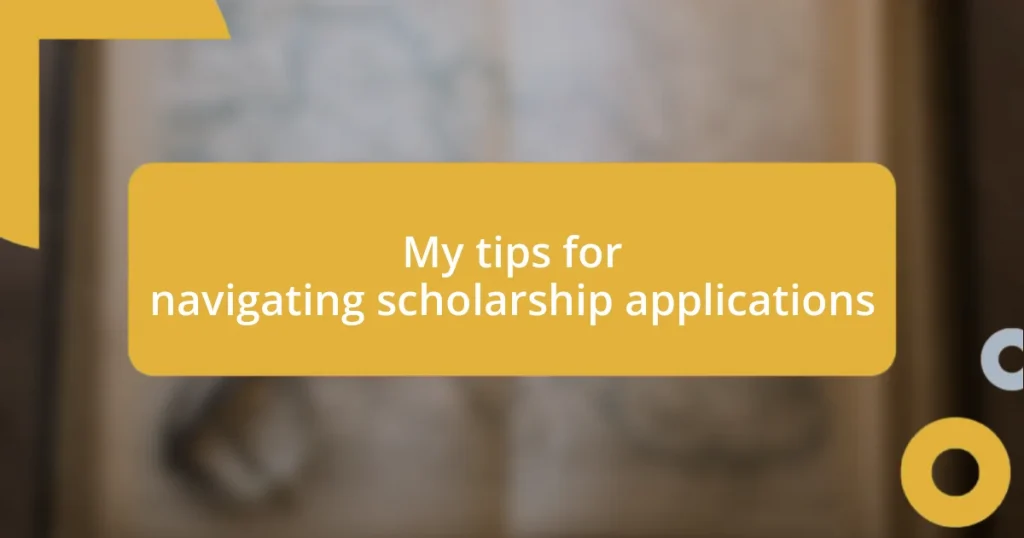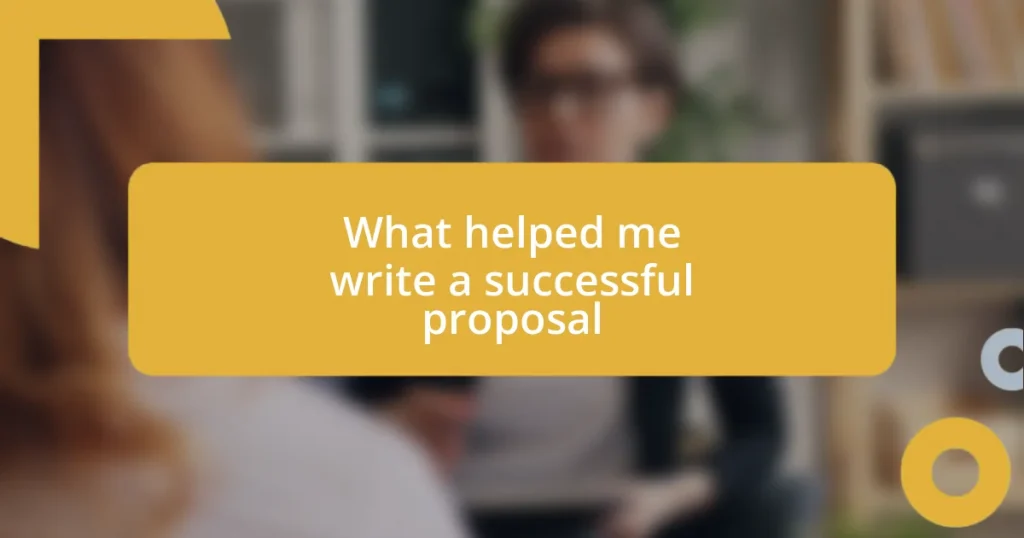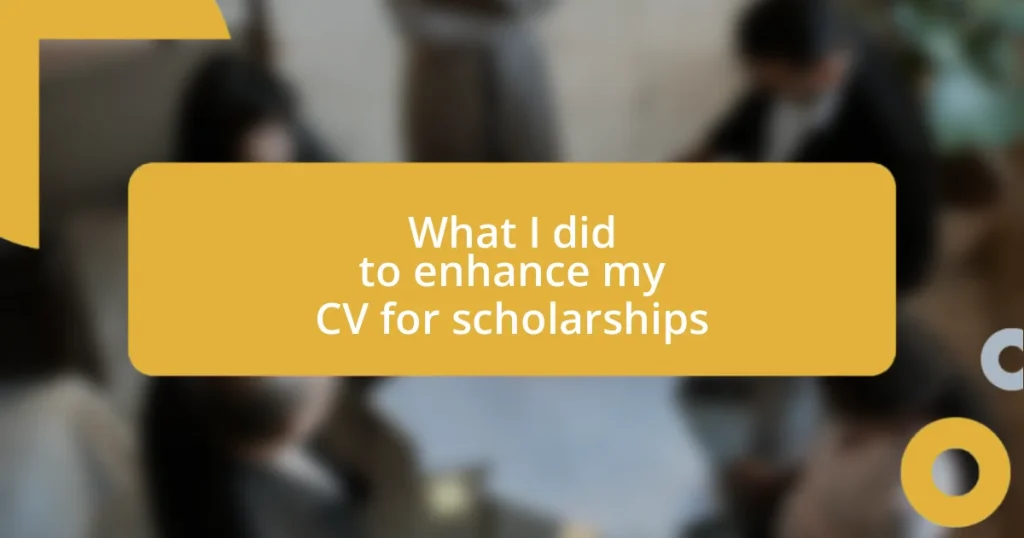Key takeaways:
- Thoroughly research available scholarships using various resources to find the best opportunities that align with your background and aspirations.
- Prepare essential application materials with attention to detail, including transcripts, strong letters of recommendation, and an authentic personal statement that tells your unique story.
- Manage deadlines effectively by using a calendar, setting reminders, and following up after submissions to demonstrate enthusiasm and build relationships.
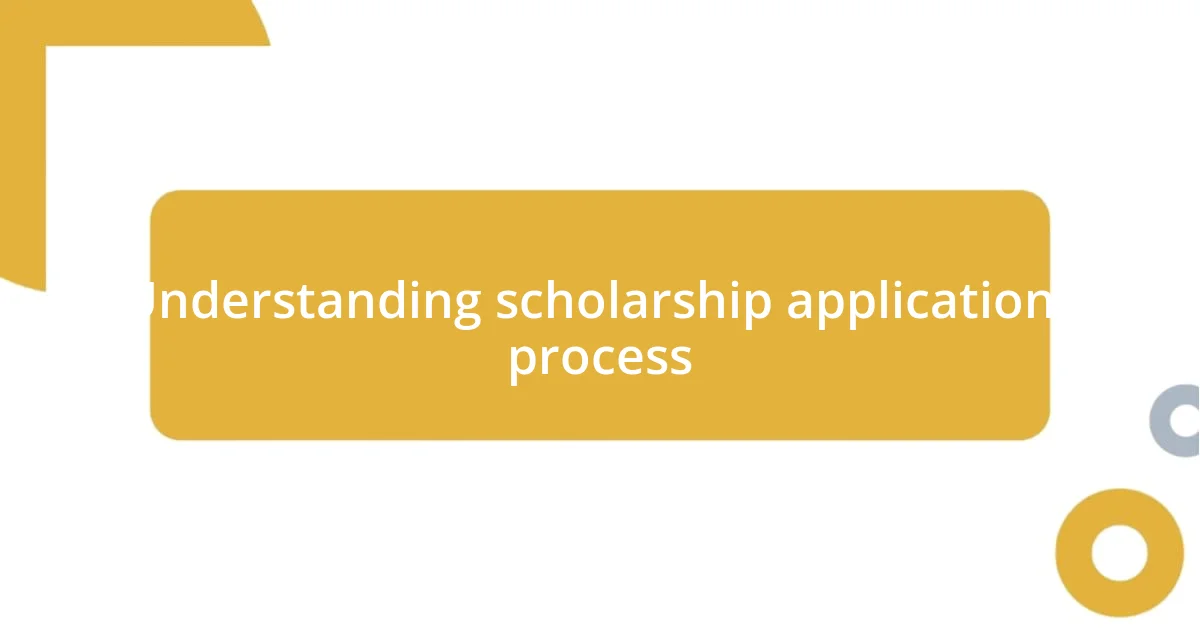
Understanding scholarship applications process
The scholarship application process can feel overwhelming at first. I remember staring at my first application, wondering where to even begin. It’s important to break it down into manageable steps, starting with carefully reading the eligibility criteria and understanding what the scholarship committee is looking for. Have you taken the time to really understand their mission?
As I crafted my personal statement, I found it crucial to convey not just my achievements but also my passion and aspirations. There’s a fine line between showcasing accomplishments and sharing your authentic self. Have you considered how your background shapes your academic goals? Relating your unique experiences can set your application apart in a sea of candidates.
Lastly, keep in mind the timelines involved. Each scholarship may have different deadlines, and I once missed a fantastic opportunity because I lost track of dates. Setting reminders and creating a calendar for your applications can ease some of that stress. How do you keep organized with your tasks? Trust me, a little organization goes a long way in this process!
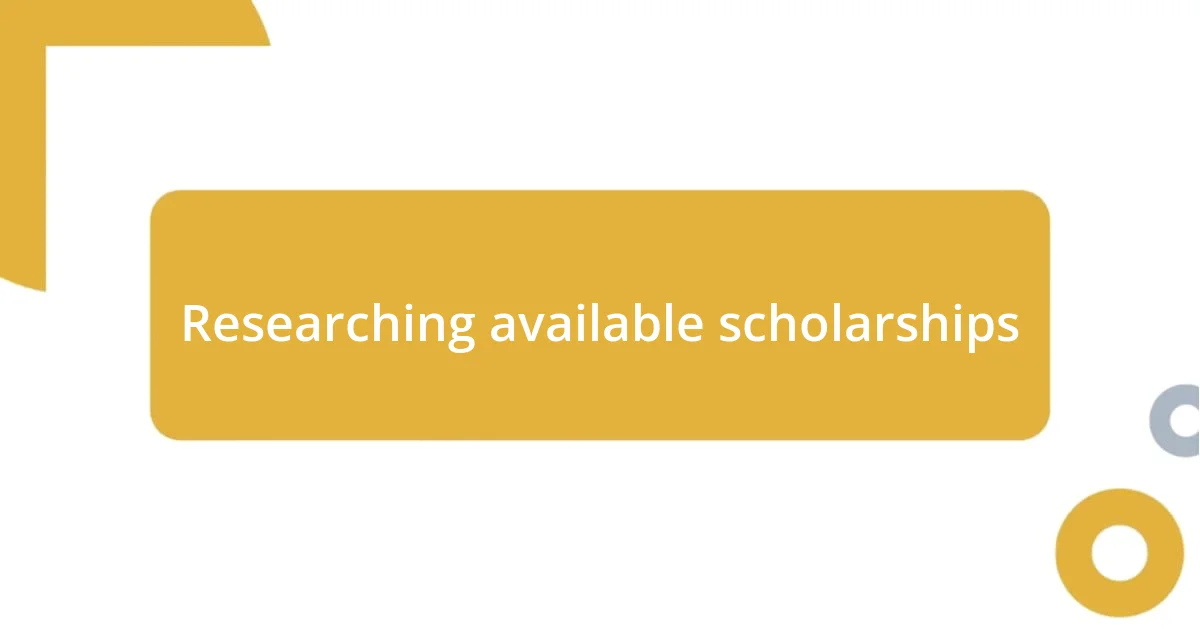
Researching available scholarships
When diving into the scholarship search, I can’t stress enough the importance of thorough research. My experience taught me that finding the right scholarships often means sifting through a multitude of options. It’s crucial to utilize various resources, such as college websites, community organizations, and online databases. I remember spending an entire weekend exploring different platforms, only to discover scholarships I initially thought I wouldn’t qualify for. You never know what opportunities could be waiting for you!
Here’s a quick list to kickstart your research process:
- College Financial Aid Office: They often have exclusive scholarships for enrolled students.
- Online Scholarship Databases: Websites like Fastweb or Cappex compile a range of opportunities tailored to different profiles.
- Community Organizations: Local clubs or nonprofits frequently offer scholarships for residents or persons with specific backgrounds.
- Professional Associations: Relevant to your field of study, these groups often have funding available for aspiring students.
- Social Media & Forums: Follow relevant groups where scholarship opportunities are frequently shared.
Each avenue you explore could unveil a hidden gem that perfectly aligns with your aspirations and circumstances. Have you allowed yourself to dream big about what these scholarships could make possible?
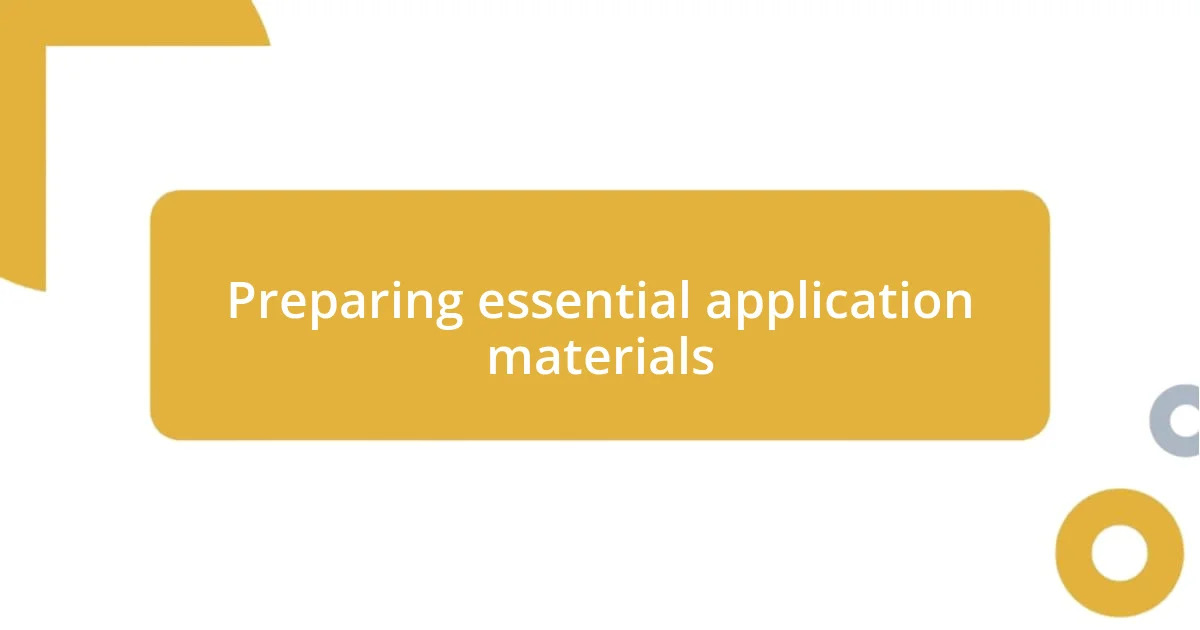
Preparing essential application materials
Preparing the essential materials for scholarship applications is a critical step that can dictate your success. I distinctly recall the feeling of panic when I realized I needed to gather my transcripts, letters of recommendation, and personal statements all in one go. Managing each document might seem daunting, but I found that creating a checklist helped me stay organized and ensured I didn’t miss any critical components. Have you ever thought about how a simple checklist could streamline your preparation?
When it comes to letters of recommendation, I highly recommend approaching mentors who truly know your journey. I remember asking a professor who inspired me throughout my studies. Their insights added a personal touch to my application and really helped to emphasize my dedication. Have you considered the impact of a heartfelt recommendation? It’s worth investing the time to cultivate these important relationships.
Lastly, pay special attention to your personal statement; it’s your opportunity to shine. It’s more than just listing your achievements—it’s about articulating your story. I often revisited my draft, tweaking it each time until I felt it genuinely represented my aspirations and experiences. Clarity, passion, and originality can leave a lasting impression on the committee, setting you apart from other candidates. So, how do you capture your unique voice?
| Essential Material | Tips |
|---|---|
| Transcripts | Request early to avoid last-minute issues. |
| Letters of Recommendation | Choose someone who knows you well and can write personally. |
| Personal Statement | Tell your story—be authentic and passionate. |
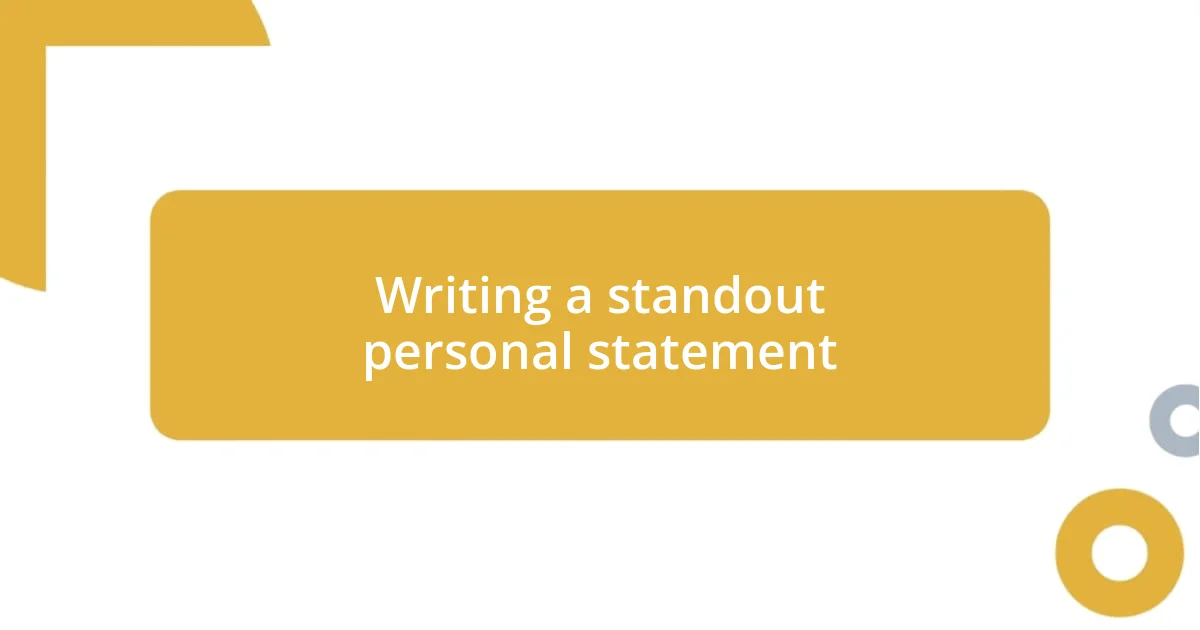
Writing a standout personal statement
Crafting a standout personal statement can feel daunting, but I like to think of it as unrolling a tapestry that showcases not just your achievements but your journey. I vividly remember when I poured my heart into my own statement during a late-night writing session, fueled by caffeine and determination. What struck me most was that the more personal I made it—sharing my struggles and triumphs—the more genuine it felt. Have you considered how your unique story could resonate with the scholarship committee?
One technique that really helped me was to vividly portray moments that shaped my character. Instead of simply stating that I volunteered at a local shelter, I described how that experience opened my eyes to the challenges faced by others. This not only highlighted my commitment to community service but painted a picture of my background and values. How memorable could your statement be if you shared vivid snapshots of your life?
Lastly, don’t shy away from showcasing your aspirations. I recall being inspired by a mentor who urged me to express my future goals within my statement. Connecting my past experiences to my future ambitions not only showed my determination but also painted a picture of who I aim to become. What do you envision for yourself? If you can articulate that dream compellingly, you might just find the application committee rooting for you!
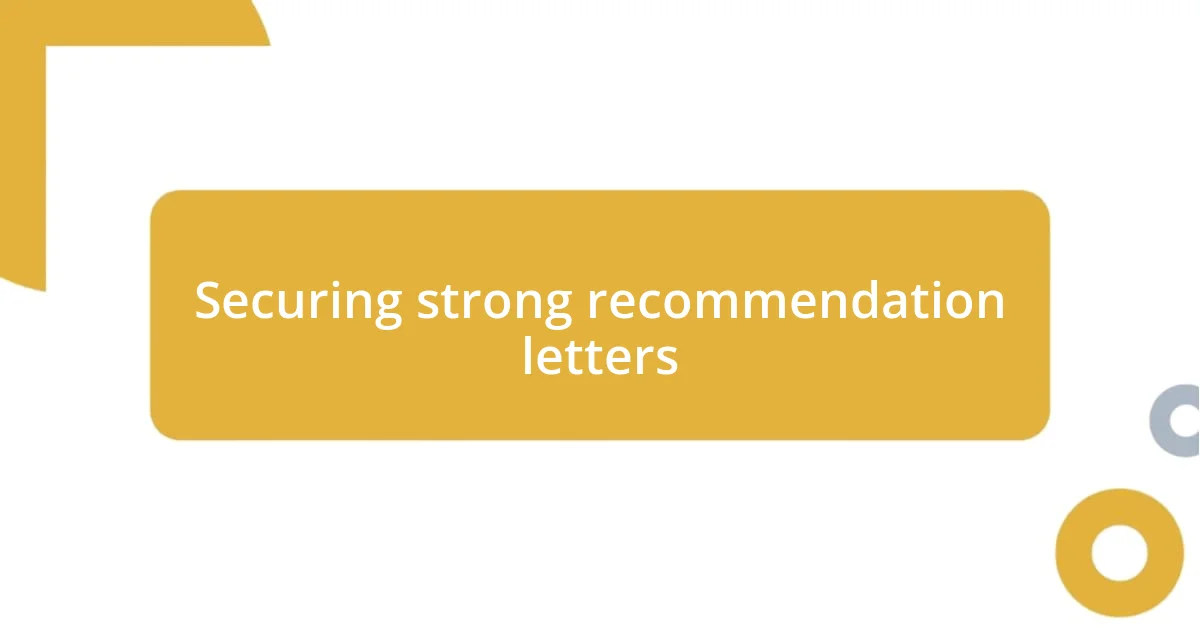
Securing strong recommendation letters
When securing strong recommendation letters, it’s crucial to approach individuals who can genuinely speak to your strengths and character. I vividly remember asking a former supervisor for my first scholarship application; the deep bond we shared made it easier for them to highlight specific moments that showcased my work ethic and passion. Have you thought about how impactful a tailored story can be in supporting your application?
Another strategy I found helpful was to provide my recommenders with a brief outline of my achievements and aspirations. This not only gave them context but also sparked memories of our shared experiences. I once shared a simple bullet point list with a mentor, and they ended up crafting a letter that felt like a heartfelt narrative, truly reflecting who I am. Have you considered how guiding your recommender with details can lead to stronger, more personalized letters?
Timing is critical in this process. I learned the hard way that asking for a recommendation letter too close to a deadline can add unnecessary pressure on both you and your recommender. I remember reaching out a month in advance, which allowed my professor the time and space to write something thoughtful rather than rushed. How often do we underestimate the power of giving someone enough time to craft a well-thought-out letter? It can make all the difference in how they portray your potential.
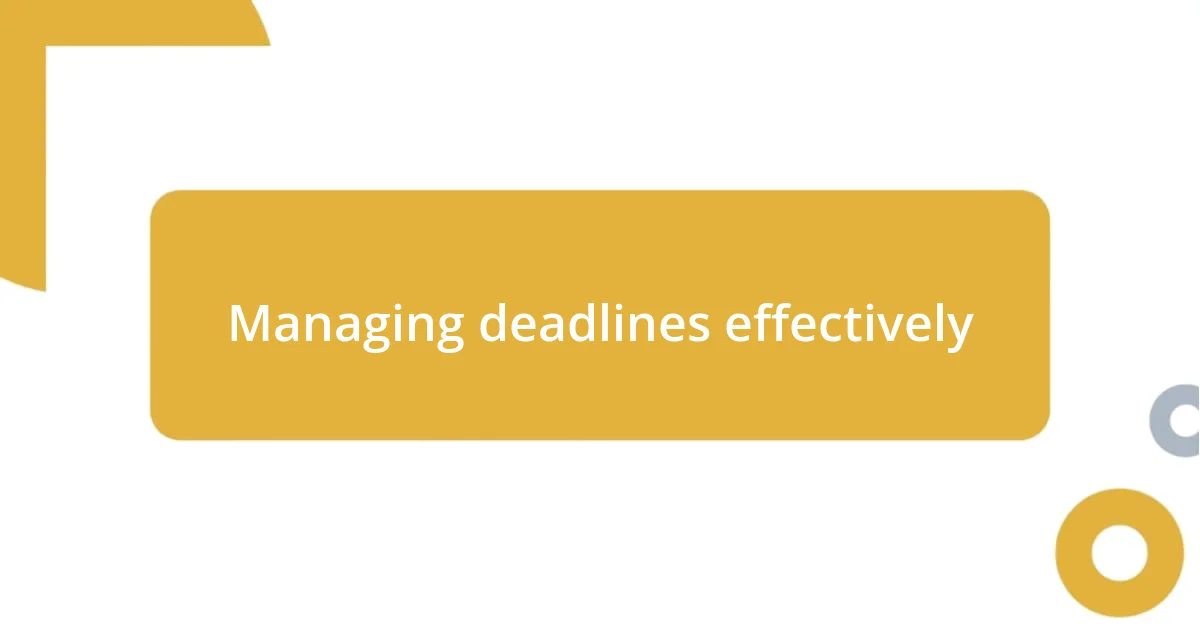
Managing deadlines effectively
Effective deadline management is essential when navigating scholarship applications. I still remember the whirlwind during my first round of applications; juggling multiple deadlines felt overwhelming. To tackle this, I created a simple calendar, marking all the submission dates. It transformed chaos into clarity and allowed me to prioritize my efforts. Have you tried utilizing a visual organizer to keep track of your deadlines? It can truly turn a daunting task into a manageable process.
As each deadline approached, I made it a point to set personal checkpoints. For instance, I allocated specific days for drafting, revising, and seeking feedback. This structured approach ensured I wasn’t scrambling at the last minute, which I certainly learned the hard way during my second round. I underestimated how long editing could take. Have you ever found yourself racing against the clock? By breaking things down into manageable chunks, I felt more in control and less stressed.
One strategy that really worked for me was setting reminders a week and a few days prior to each deadline. I used to save those tasks until the night before, but sending myself alerts helped hold me accountable. I learned this after missing one deadline due to a simple oversight. Just that little nudge can ensure you never have to experience that sinking feeling of last-minute chaos again. What reminders can you set to keep yourself on track?
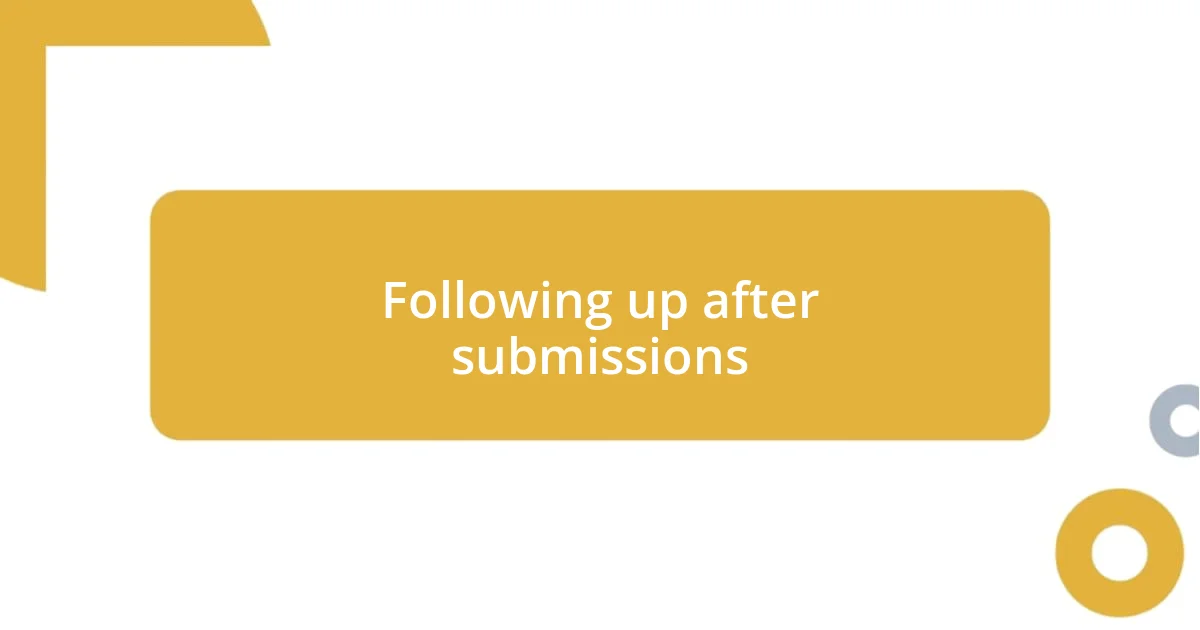
Following up after submissions
Following up after you’ve submitted your scholarship applications can be a game-changer. I remember after sending in my applications, I felt a mix of anticipation and anxiety. I decided to follow up with a polite email a couple of weeks later, expressing gratitude for their consideration. Not only did it show my enthusiasm, but I also got some valuable feedback that helped me improve for future applications. Have you thought about how a simple follow-up can differentiate you from other candidates?
It’s essential to be mindful about timing when you reach out. I once waited three weeks before checking in, and it led to a very positive conversation. The scholarship coordinator mentioned they appreciated my initiative and even provided insights about the selection process. I learned that being proactive—without being pushy—can leave a lasting impression. Have you ever considered how your approach could influence the perception of your commitment?
Lastly, don’t forget the importance of being gracious, regardless of the outcome. I’ve had my share of rejections, and I always sent a thank-you note to express appreciation for the opportunity. One time, I received a kind response from the committee, encouraging me to apply again next year. It reinforced my belief that fostering relationships can open doors beyond just this one application. How often do we overlook the power of gratitude in building a network?










